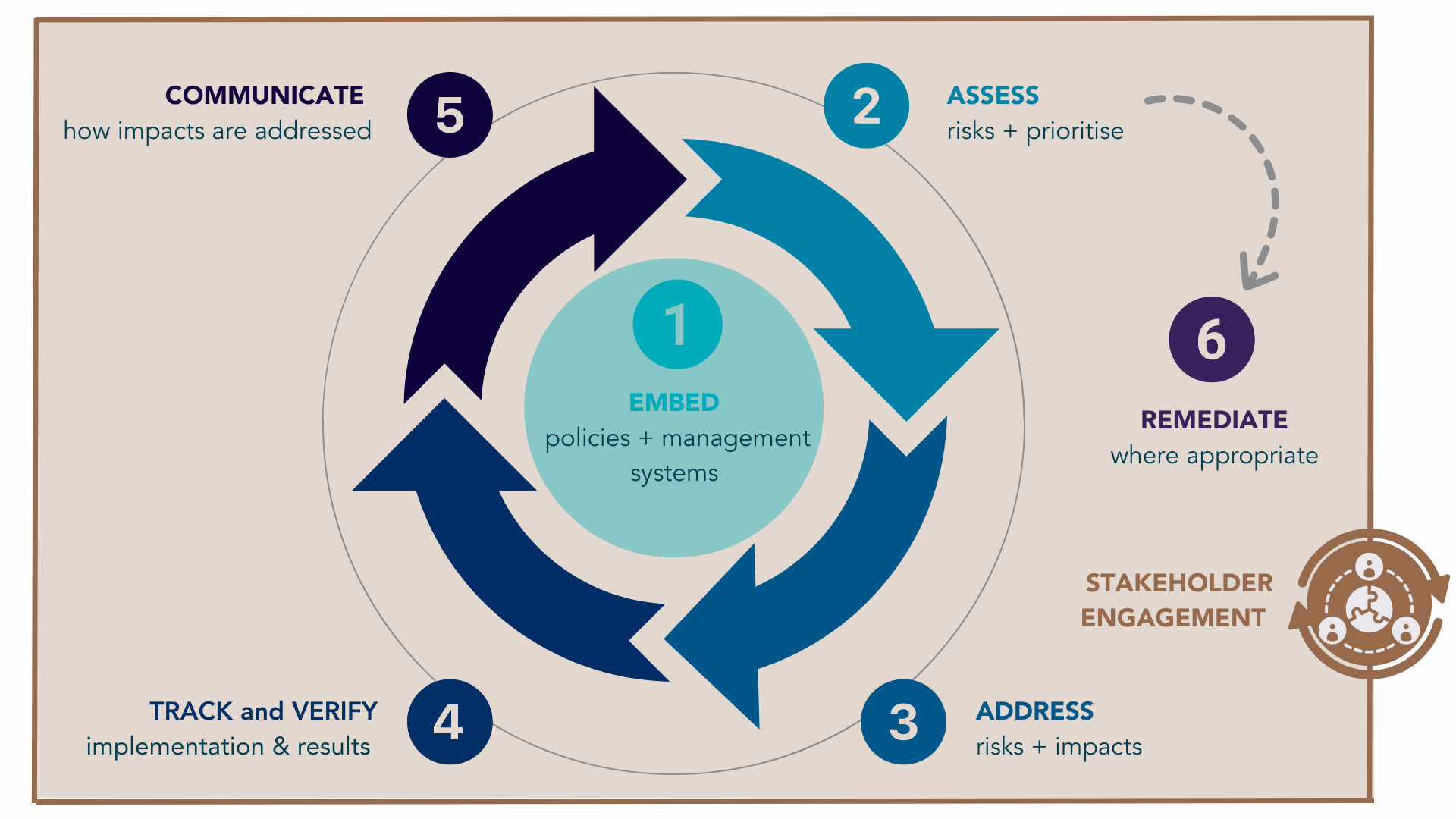Our Responsible Sourcing team advises and assists companies, governments, civil society organisations, and industry and multi-stakeholder groupings to implement, advocate for, and incentivise various aspects of human rights and environmental due diligence in line with international norms. These include the OECD Guidelines for Multinational Enterprises on Responsible Business Conduct and accompanying OECD guidance, and the UN Guiding Principles on Business and Human Rights.
Our work in responsible sourcing is focused on implementation of holistic due diligence in line with the OECD 6 steps for due diligence. We work with our clients to realise the opportunity of meaningful, effective due diligence that goes beyond tick-box exercises and addresses risks and impacts at root cause level. We specialise in helping clients understand the connection between legal requirements for due diligence, global norms on due diligence, and common industry practice.
Our clients are active in a range of sectors that use minerals and metals, including automotive, ICT, electronics, consumer goods, renewable energy, jewellery, packaging, and smelting, refining and trading of metals and metals. We work with some of the world’s largest companies through to start-ups and small- and medium-sized enterprises.
Types of support we provide to clients in this business area include:
- Strategy and buy-in: we work with clients to develop effective strategies for responsible sourcing that respond to and further development current practices and buy-in for effective due diligence within their organisation
- Gap analyses and improvement roadmaps: we help clients build an understanding of where they need to make improvements in their due diligence, and build tailor-made roadmaps to guide their journey of improvement
- Implementing the six steps of due diligence: we bring hands-on expertise in all aspects of this, and specialise in working with clients to develop and implement risk prevention and mitigation measures that go beyond sole reliance on audits
- Dialogue and engagement: we specialise in designing and facilitating dialogue and engagement about due diligence – including within the supply chain, across stakeholders, in small private settings or large public events
Levin Sources does not provide auditing services. This enables us to provide independent, objective advice to clients about the correct role for auditing within their larger due diligence efforts. We do work with clients to critically review audit findings and we also carry out independent assessments of high-risk suppliers and sites.
Selected examples of our work in responsible sourcing
Strategy and buy-in
- Year-long engagement with a midsize company to take them beyond compliance in high-risk and conflict-affected sourcing and demonstrate holistic, 6-step due diligence for demanding customers and investors. Programme of work included interviews and workshops with a range of functions including procurement, sustainability, and business development, focused on identifying goals, challenges, and building buy-in and understanding for responsible sourcing. Developed responsible sourcing strategy and foundations of policy ecosystem.
- Ongoing support to a small business and its primary investor to build internal understanding of and senior management buy-in for holistic responsible sourcing and human rights and environmental due diligence. Co-creation and delivery of in-person workshops on due diligence expectations and potential approaches for the business to build its responsible sourcing and sustainability profile within its means.
Gap analyses and improvement roadmaps
Detailed gap analysis and recommendations for improvements developed for multiple clients in the automotive, renewable energy technology, ICT, and consumer goods sectors. Recommendations focus on getting a smart mix of measures that fulfil mandatory requirements (e.g., regulations, investor or customer requirements), prepare the business to mature toward leading practice, and are feasible within the businesses’ means and capabilities. Regulatory requirements that we regularly work with for these analyses and recommendations include the EU Batteries Regulation, the German Act on Corporate Due Diligence Obligations in Supply Chains, the EU Deforestation Regulation, the EU Corporate Sustainability Due Diligence Directive, the EU Conflict Minerals Regulation, the US Dodd-Frank Act, ‘modern slavery’ and forced labour regulations in various jurisdictions, and numerous others. |
Read more about our work with due diligence regulations here
Implementing the six steps of due diligence

We work extensively on the implementation of due diligence, with a particular speciality in working with businesses, governments, and civil society to design innovative measures to tackle systemic risks and impacts using approaches that go beyond audits. A few examples of our work include:
- Policy and embedding: we conduct reviews and author or amend due diligence policies with businesses across a range of sectors. We focus on crafting policies that work for a range of purposes, including regulatory compliance, fulfilling customer and investor requirements, and aligning with international norms.
- Identify, assess, prioritise risks and impacts: we are leaders in carrying out research and analysis of risks and impacts for people and the environment in the minerals sector, for instance as the research partner for the Raw Material Outlook operated by Drive Sustainability. We also carry out independent assessments of suppliers, in line with international norms and regulations. We train companies on how to identify risks and prioritise them in line with global norms and regulations, and carry out analyses of salient risks and impacts, working with clients to make a very large list of issues manageable, based on principled prioritisation.
- Prevent and mitigate risks: we work with businesses that are ready to go beyond audits to use leverage and take concrete action in their supply chains. For our work with the German Sector Dialogues (see below), we authored a guidance on going beyond audits to prevent and mitigate risks in the copper supply chain. With several clients in the automotive, consumer goods, and ICT sectors, we have developed strategies for them to build and exercise their leverage with their supply chain, including providing strategies and tools to facilitate effective supplier engagement.
- Tracking effectiveness: as an independent voice on the role of auditing in due diligence, we contribute to more effective approaches in assurance of due diligence through various engagements, such as moderating dialogue on challenges in responsible sourcing auditing for the London Metal Exchange and the OECD, authoring guidance about what to look for in meaningful audit approaches in responsible sourcing, and our 3-year European project to identify models for assurance that put affected people more centrally in the process.
- Communicate: see our case study page on we support effective due diligence through disclosure
- Engaging stakeholders, enabling access to remedy: we integrate consideration for affected people into all of our work, recognising that “if we do not integrate the perspectives of affected people across due diligence practice, we have not performed due diligence.” This positions us to be a unique partner when working with clients on remedy, such as our work with a downstream company to analyse the effectiveness of a supplier’s community engagement and grievance mechanism, and recommend how the company can use its leverage with other suppliers around issues of community impacts and enabling access to remedy.
Dialogue and engagement
- We facilitate and advise multi-stakeholder groupings working on responsible sourcing, bringing expertise and sensitivity to these complex settings. Examples include the German Sector Dialogues for the automotive and energy sectors (focus on supply chain leverage, stakeholder engagement, field research and identification of salient risks and impacts, assessments of assurance schemes and smart use of schemes, risk mitigation measures going beyond audits), the Global Battery Alliance (focus on requirements on human rights and child labour risk management, and critical minerals strategy), and the Dutch International Responsible Business Conduct Agreement process for the metals sector (focus on identifying risks in sourcing).
- We facilitate and moderate at times sensitive and complex discussions in public and private settings, for organisations such as the German Sector Dialogues and the German Federal Ministry of Labour and Social Affairs, the OECD, the London Metal Exchange, the Cobalt Institute, and individual businesses.



